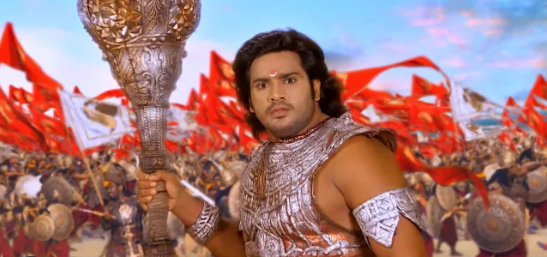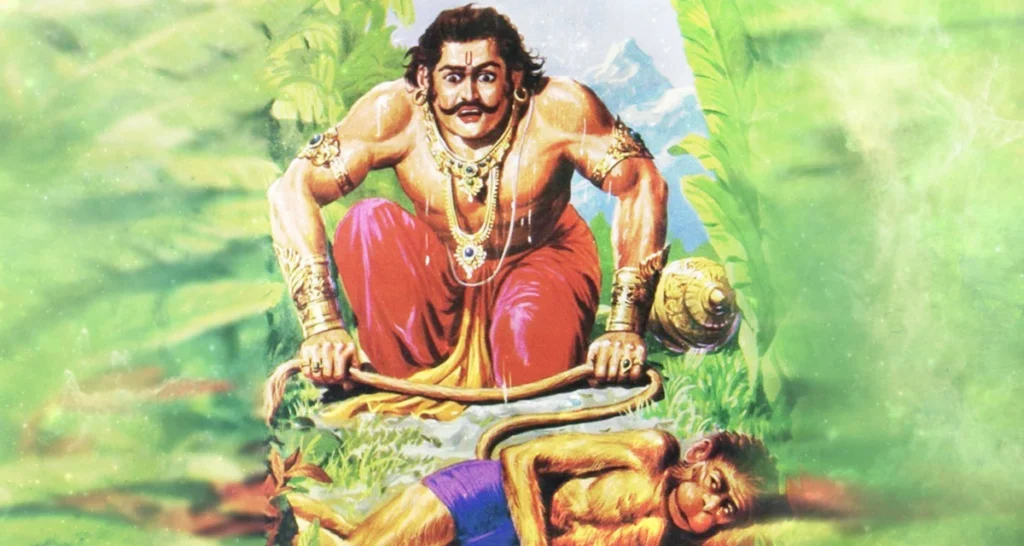Vrikodara Bhima Mahabharata

Who is Lord Bhima?
Bhima, also known as Bhimasena or Bhima Vrikodara, is known for his brash and violent nature & he is the second son of Pandu, the king of Hastinapura, and his wife Kunti. Bhima is famous for his strength and power, able to tear apart mountains with his bare hands and carry an entire mountain on his shoulders. He was one of the 5 Pandava brothers.
Bhima Story & Role in Mahabharata
Family Background: Bhima became the second of the five Pandava brothers. His mom, Kunti, had prayed to distinct gods, resulting in each Pandava’s beginning by using a specific deity. Bhima become born with the advantages of the god Vayu, which made him exceptionally robust and fearless.
Physical Strength: Bhima was regarded for his amazing bodily electricity. He changed into a effective warrior, capable of defeating severa warring parties in warfare. His energy made him an vital asset to the Pandava facet within the great Kurukshetra warfare.
Character Traits: Bhima became often depicted as a honest and impulsive man or woman. He changed into known for his honesty and loyalty to his circle of relatives, in particular his elder brother, Yudhishthira. He had a voracious urge for food and cherished food, that’s a famous characteristic of his.
Skills and Achievements: Bhima become skilled in various styles of fight, inclusive of wrestling and mace preventing. He is well-known for his duel with Duryodhana, the chief of the Kauravas, in which he struck a crippling blow to Duryodhana’s thighs. This event performed a crucial role in the unfolding of the Kurukshetra struggle.
Adventures and Challenges: Throughout the Mahabharata, Bhima encountered diverse demanding situations, consisting of battles with effective warring parties, and embarked on adventurous quests. These adventures and demanding situations showcased his bravery and heroism.
Personality and Relationships: Bhima’s persona became marked by means of his sturdy sense of justice. He changed into protective of his family, specifically his mom, Kunti, and his wife, Draupadi. His dating with Draupadi is noteworthy because he was one in all her five husbands, and he played a protective function whilst she confronted humiliation inside the Kaurava court docket.
Role in the Kurukshetra War: Bhima’s martial skills and braveness made him a key discern inside the Mahabharata’s valuable event, the Kurukshetra struggle. He participated in numerous crucial battles, and his bodily prowess changed into a formidable pressure on the Pandava aspect.
Lesser-known facts and aspects of Bhima from the Mahabharata:
Bhima’s Love for Cooking: Besides his brilliant energy, Bhima had a passion for cooking. He become an superb chef and cherished getting ready loads of dishes. His culinary skills had been particularly highlighted throughout the Pandavas’ years in exile, where he cooked meals for his own family within the disguise of a Brahmin.
Ghatotkacha – Bhima’s Son: Bhima had a son named Ghatotkacha, born to him and the demoness Hidimba at some point of the Pandavas’ exile inside the wooded area. Ghatotkacha later played a critical function in the Kurukshetra warfare, in which he used his magical talents to useful resource the Pandavas.
Bhima’s Benevolence: Bhima was no longer just recognised for his physical strength however additionally for his generous and compassionate nature. He often helped the needy and oppressed, reflecting his experience of justice and kindness.
Bhima’s Flight to Heaven: After the Kurukshetra war, the Pandavas decided to renounce the world and embark on their final journey to the Himalayas. Bhima, the second Pandava, was the only one to reach the gates of heaven alive. This event is often interpreted as a representation of his unique qualities and his divine heritage.
Bhima’s Role in Draupadi’s Cheer-Haran: During the infamous episode in which Draupadi become disrobed inside the Kaurava courtroom, Bhima vowed to avenge the humiliation and swore that he might drink Dushasana’s blood, a promise he fulfilled at the battlefield of Kurukshetra.
Bhima and Duryodhana’s Friendship: Before the animosity between the Pandavas and the Kauravas escalated, Bhima and Duryodhana, the Kaurava prince, were early life buddies. They shared a robust bond and a aggressive spirit in their adolescents, however the courting later turned bitter because of the developing rivalry between their households.
Bhima’s Battle with Bakasura: In the sooner days, for the duration of their exile within the forest, Bhima encountered and defeated a powerful demon named Bakasura. This incident verified his strength and valor, even before the Kurukshetra warfare.
Bhima’s Battle with Jarasandha:
In summary, Bhima turned into a giant person in the Mahabharata, regarded for his exquisite strength, unwavering loyalty to his circle of relatives, and his position as a key warrior inside the epic’s mythical battles. His person represents the values of electricity, braveness, and justice that are relevant to the Mahabharata’s moral and ethical themes.
Bhima's Wife
Bhima had several wives. His principal wife was Draupadi, the common wife of all five Pandava brothers. Additionally, Bhima had other wives, including Hidimbi, the Rakshasi princess whom he married during his exile in the forest, others wifes include Balandhara, the daughter of the king of Kasi, Kekaya princess of Kumari.
Son of Bhima
Bhima had several sons. Ghatotkacha was his most famous son, born to him from his marriage with Hidimbi, a Rakshasi. Bhima also had other sons named Sutasoma and Sarvaga.
Father of Bhima's
Bhima’s father is Pandu also he is known as Vayuputra, as he is the rebirth of the wind god Vayu, who entered Kunti’s body through yoga-shakti and was born as Bhima
Bhima Other Names
Bhima is referred to by various names and epithets, each highlighting different aspects of his character and prowess. Here are some of the names of Bhima mentioned in the Mahabharata:
- Bhima: His primary name, which means ‘terrible’ or ‘formidable,’ reflecting his immense physical strength and valor.
- Vrikodara: Meaning ‘wolf-bellied,’ emphasizing his voracious appetite and robust physique.
- Ghatotkacha: This name refers to Bhima’s son with Hidimbi, a Rakshasi. Ghatotkacha was a powerful warrior who fought alongside the Pandavas in the Kurukshetra war.
- Jihva-bandha: Translating to ‘tongue-tied,’ a name given to Bhima when he fought the demon Bakasura and was unable to speak due to the demon’s grip on his tongue.
- Vayuputra: Son of Vayu, the Wind God, highlighting his divine parentage and connection to the elemental forces.
- Ashtapalaka: One of the eight attendants of Kubera, the god of wealth. Bhima acquired this name during his exile when he served as a cook in the Matsya kingdom.
- Ballava: A name used to refer to Bhima during his time incognito in the Virata kingdom, where he worked as a cook.
- Hidimbabhid: This epithet refers to Bhima as the slayer of Hidimba, the Rakshasa brother of Hidimbi, whom Bhima killed in the forest.
- Krodhavasha: Meaning ‘one whose anger is uncontrollable,’ underscoring Bhima’s fiery temperament and fierce demeanor.
- Raktavilochana: Translating to ‘one with blood-red eyes,’ highlighting Bhima’s ferocity and battle prowess.
Bhima and Hanuman Story

As Bhimasena, the mighty Pandava warrior, seeks the exotic Saugandhika flower, he encounters Hanuman, the powerful son of Vayu, in a grove of banana trees. Despite his immense strength, Bhima is challenged by Hanuman, who refuses to let him pass.
A dialogue ensues between the two formidable beings, with Bhima asserting his identity and lineage as a Kshatriya of the illustrious Kuruvamsa. However, Hanuman, recognizing his brother in Bhima, advises him against proceeding further, warning of impending danger. Bhima insists on continuing his journey, prompting Hanuman to test his resolve. Unable to move Hanuman, Bhima is humbled and acknowledges the greatness of his brother, recounting Hanuman’s legendary leap across the ocean in service to Lord Rama. As Bhima attempts to move Hanuman’s tail, he is met with resistance, realizing the futility of his actions. Overwhelmed by humility and defeat, Bhima seeks forgiveness from Hanuman, acknowledging his own shortcomings and revering the divine presence before him.
In this poignant encounter, Bhima learns a valuable lesson in humility and respect, recognizing the divine essence pervading all beings, even in the form of an old and weary monkey. Thus, with folded hands and a contrite heart, Bhima pays homage to Hanuman, acknowledging his superiority and seeking his blessings.
Frequently asked Questions about Bhima Mahabharata
Q1. Bheem is son of which God?
Bhima is considered the son of Vayu, the god of wind. According to the Mahabharata and other ancient texts, Bhima’s mother, Kunti, invoked Vayu through a boon she received from the sage Durvasa. As a result of this invocation, Bhima was born with the assistance of Vayu’s divine energy.
Q2. What was height of bhima in Mahabharata?
Some studies claim that he was 6 ft 5 Inches.
Q3. Who kiled Bhima?
Bhima does not meet his end during the course of the epic. He survives the Kurukshetra War and lives to see its conclusion.
Q4. Meaning of Vrikodara?
The term “Vrikodara” is an epithet commonly used for Bhima in the Mahabharata. It translates to “wolf-stomached” or “wolf-bellied” in Sanskrit. It refers to Bhima’s legendary appetite and his ability to consume large quantities of food. This epithet highlights Bhima’s physical strength and prowess, particularly in terms of his voracious appetite and his capacity for consuming vast amounts of food.
Q5. How many people did bhima killed in Mahabharat?
Bhima kills his 100 kaurava brothers for humiliating Draupadi & is thus termed as slayer of Kaurava Brothers.
Duhsasana: Bhima drank the blood of his brother Duhsasana in the field of battle without anyone being able to prevent him.
Kichaka: Bhima kills the vile Kichaka, who attempts to molest Draupadi.
Hidimba: Bhima kills Hidimba, the brother of Hidimbi, after meeting the Pandavas in the dreadful jungle.
Kirmira: Bhima kills Kirmira in the forest.
Jatasura: Bhima kills Jatasura.
Baka: Bhima kills the Rakshasa Baka.
Susarman’s horses and bodyguard: Bhima kills Susarman’s horses and bodyguard in battle.
Various warriors and enemies: Bhima is mentioned to have demolished thousands of chariots, slaughtered elephants, horses, and footsoldiers with his mace during battles.
Duryodhana: Bhima recalls Duryodhana’s unfair actions throughout the war, including the infamous dice game where Draupadi was humiliated and the numerous attempts on the Pandavas’ lives. Fueled by rage and a sense of justice, Bhima delivers a fatal blow to Duryodhana’s thighs, shattering them with his mace.
